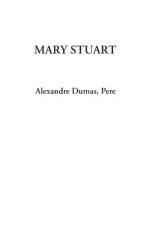“Your ancestors, my lord, were brave and loyal enough for me not to refuse to believe what you tell me. Besides, such a good blade must have rendered them good service.”
“Yes, madam, yes, surely it has done so, but that kind of service that kings do not forgive. He for whom it was made was Archibald Bell-the-Cat, and he girded himself with it the day when, to justify his name, he went to seize in the very tent of King James III, your grandfather, his un worthy favourites, Cochran, Hummel, Leonard, and Torpichen, whom he hanged on Louder Bridge with the halters of his soldiers’ horses. It was also with this sword that he slew at one blow, in the lists, Spens of Kilspindie, who had insulted him in the presence of King James IV, counting on the protection his master accorded him, and which did not guard him against it any more than his shield, which it split in two. At his master’s death, which took place two years after the defeat of Flodden, on whose battlefield he left his two sons and two hundred warriors of the name of Douglas, it passed into the hands of the Earl of Angus, who drew it from the scabbard when he drove the Hamiltons out of Edinburgh, and that so quickly and completely that the affair was called the ‘sweeping of the streets.’ Finally, your father James V saw it glisten in the fight of the bridge over the Tweed, when Buccleuch, stirred up by him, wanted to snatch him from the guardianship of the Douglases, and when eighty warriors of the name of Scott remained on the battlefield.”
“But,” said the queen, “how is it that this weapon, after such exploits, has not remained as a trophy in the Douglas family? No doubt the Earl of Angus required a great occasion to decide him to-renounce in your favour this modern Excalibur”. [History of Scotland, by Sir Walter Scott.—“The Abbott”: historical part.]
“Yes, no doubt, madam, it was upon a great occasion,” replied Lindsay, in spite of the imploring signs made by Melville, “and this will have at least the advantage of the others, in being sufficiently recent for you to remember. It was ten days ago, on the battlefield of Carberry Hill, madam, when the infamous Bothwell had the audacity to make a public challenge in which he defied to single combat whomsoever would dare to maintain that he was not innocent of the murder of the king your husband. I made him answer then, I the third, that he was an assassin. And as he refused to fight with the two others under the pretext that they were only barons, I presented myself in my turn, I who am earl and lord. It was on that occasion that the noble Earl of Morton gave me this good sword to fight him to the death. So that, if he had been a little more presumptuous or a little less cowardly, dogs and vultures would be eating at this moment the pieces that, with the help of this good sword, I should have carved for them from that traitor’s carcass.”
At these words, Mary Seyton and Robert Melville looked at each other in terror, for the events that they recalled were so recent that they were, so to speak, still living in the queen’s heart; but the queen, with incredible impassibility and a smile of contempt on her lips—




